

Www.mugu.com/galton/books/hereditary-genius/text/pdf/galton-1869-genius-v3.pdf. Galton-1869-genius-v3.pdf. Eugenics, Information about Eugenics. Eugenics is a scheme for improving the human race by controlling reproduction.
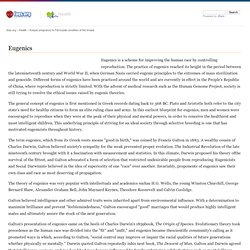
The practice of eugenics reached its height in the period between the latenineteenth century and World War II, when German Nazis carried eugenic principles to the extremes of mass sterilization and genocide. Different forms of eugenics have been practiced around the world and are currently in effect in the People's Republic of China, where reproduction is strictly limited. With the advent of medical research such as the Human Genome Project, society is still trying to resolve the ethical issues raised by eugenic theories.
The general concept of eugenics is first mentioned in Greek records dating back to 368 BC. Plato and Aristotle both refer to the city state's need for healthy citizens to form an elite ruling class and army. Francis Galton. Sir Francis Galton was an English explorer, anthropologist, eugenicist, geographer and meteorologist.
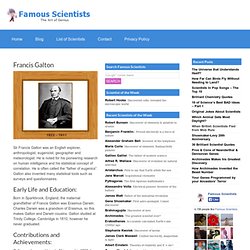
He is noted for his pioneering research on human intelligence and his statistical concept of correlation. "Eugenics: Its Definition, Scope and Aims" by Francis Galton. Francis Galton THE AMERICAN JOURNAL OF SOCIOLOGY Volume X; July, 1904; Number 1 EUGENICS is the science which deals with all influences that improve the inborn qualities of a race; also with those that develop them to the utmost advantage.
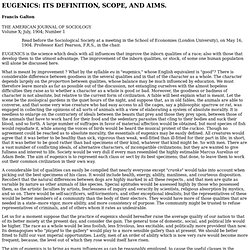
The improvement of the inborn qualities, or stock, of some one human population will alone be discussed here. What is meant by improvement ? What by the syllable eu in "eugenics," whose English equivalent is "good"? A considerable list of qualities can easily be compiled that nearly everyone except "cranks" would take into account when picking out the best specimens of his class. Let us for a moment suppose that the practice of eugenics should hereafter raise the average quality of our nation to that of its better moiety at the present day, and consider the gain. The aim of eugenics is to bring as many influences as can be reasonably employed, to cause the useful classes in the community to contribute more than their proportion to the next generation. Collection highlights. The majority of the Collection is formed by the Galton Bequest, left to College by Galton on his death in 1911.
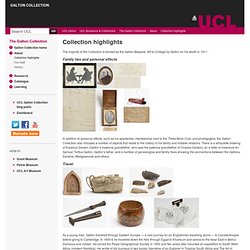
Who Is Sir Francis Galton? Sir Francis Galton, sometimes described as the last of the great Victorian polymaths, was a man whose contributions, generosity, and legacy have an enormous effect on our society, and yet few of us know his name.
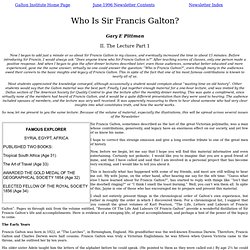
I hope to correct this strange omission and give a long overdue tribute to one of the great men of history. Now, before we begin, let me say that I hope you will find this material informative and even entertaining. Certainly not pedantic. I would like you to imagine that you are a good friend of mine, and that I have called and said that I am involved in a personal project that has become very exciting, and I would like to tell you about it. This is basically what has happened with some of my friends, and most are still willing to hear me out. I shall not entirely present things in the chronological order of Galton's own experience, but rather in roughly the order in which I discovered them. The Early Years The African Explorer The Weather Map. The British Journal for the History of Science, Vol. 34, No. 3 (Sep., 2001), pp. 323-340. Francis Galton. Eugénisme. Un article de Wikipédia, l'encyclopédie libre.
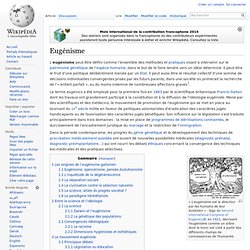
L’eugénisme peut être défini comme l’ensemble des méthodes et pratiques visant à intervenir sur le patrimoine génétique de l’espèce humaine, dans le but de le faire tendre vers un idéal déterminé. Il peut être le fruit d’une politique délibérément menée par un État. Il peut aussi être le résultat collectif d’une somme de décisions individuelles convergentes prises par les futurs parents, dans une société où primerait la recherche de l’« enfant parfait », ou du moins indemne de nombreuses affections graves[1].
Le terme eugenics a été employé pour la première fois en 1883 par le scientifique britannique Francis Galton dont les travaux ont grandement participé à la constitution et à la diffusion de l'idéologie eugéniste. Les origines de l’eugénisme galtonien[modifier | modifier le code] L'étymologie du mot « eugénisme » est grecque : eu (« bien ») et gennaô (« engendrer »), ce qui signifie littéralement « bien naître ». Intelligence and Intelligence Testing - Richard B Fletcher, John Hattie - Google Livres. Intelligence and Intelligence Testing - Richard B Fletcher, John Hattie - Google Livres.
Rationalizing Capitalist Democracy: The Cold War Origins of Rational Choice ... - S.M. Amadae, Sonja Michelle Amadae - Google Livres. Francis Galton - Biography - Anthropologist, Inventor, Explorer, Scientist. Francis Galton was an English explorer and anthropologist best known for his research in eugenics and human intelligence.

He was the first to study the effects of human selective mating. Synopsis Born in Birmingham, England, on February 16, 1822, Francis Galton was an explorer and anthropologist known for his studies in eugenics and human intelligence. As a child, Galton rejected conventional methods of teaching, and he began studying medicine in his teens. He soon embraced a passion for travel with the help from a sufficient fortune left to him from his father.